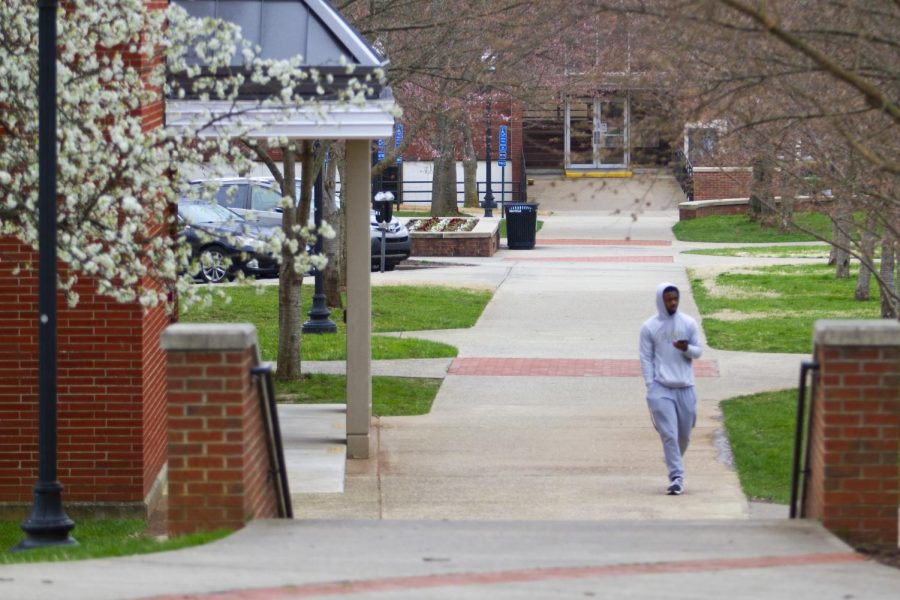How different on-campus services are working amid the pandemic
April 20, 2020
The lives of WKU’s faculty and staff have changed significantly amid the COVID-19 pandemic.
After transitioning to online learning for the remainder of the Spring term and requiring all students without extenuating circumstances to vacate residence halls, approximately 50 students remain on campus.
Many departments – such as Media Relations and Parking and Transportation – have transitioned to work remotely, while departments like Facilities remain in operation on campus to maintain essential services.
According to Director Ken Branch, maintenance has focused its efforts on ensuring that all safety equipment is functioning at all times. Services that fall into this category, Branch said, include elevators and commercial backup generators.
Branch stated that crews are doing daily walk throughs in all the buildings on campus to look for things that might need fixing.
Maintenance crews maintain distance between themselves and others on campus while going about their work, which has been the biggest challenge, Branch said.
“We work through how we’re going to do it, maintain social distancing, and how we do it and maintain distance from the staff and faculty that might be in an area,” Branch explained. “So, there’s lot more operational playing with extra parameters in terms of how we do this and respect of the precautions with COVID-19.”
Branch said this policy of maintaining social distancing carries over into maintenance’s responses to requests coming from the remaining students in Hilltopper Hall. Response to maintenance requests require an extra level of communication to ensure the health and safety of both staff and students.
“So just extra communication, extra steps,” Branch said. “As I keep telling the crews, unless there’s a real emergency, there is no rush.”
Branch said maintenance’s priority at this time is “safety first.”
Bob Skipper, Director of Media Relations at WKU, said that his office is working remotely.
“Not being in the office is a bit of a challenge, and not being able to work face to face with people,” Skipper said. “But we’ve managed with technology.”
Skipper said through the use of Zoom and social media, his office is still able to get the job done, although they have scaled back on their normal operations such as promoting academic stories and the lack of athletics.
“More of our focus has been on the changes that we’ve had to deploy to meet our current situation,” Skipper explained. “Now we’re able to start looking for more of those success stories that we’re able to feature on how people are coping and making the most of the situation, and in some cases even thriving, with the current arrangement.”
As WKU transitions to “more of a normal situation,” Skipper said the attention of media relations will shift to that.
Like Media Relations, Parking and Transportation Services is working remotely during this time.
PTS Director Jennifer Tougas noted that the changes have been an adjustment across campus.
Tougas said that working from home is very different from being in the office, where she’d be surrounded by people and communication, and where she’d be able to bounce ideas off of someone just by walking down the hall.
“Working virtually changes all of that, and it’s definitely a new reality,” Tougas said.
With no more events on campus, Tougas said, a large part of PTS operations had to undergo a significant adjustment.
The absence of PTS’ focus on events has allowed PTS to focus on long term goals such as ensuring that their policies and websites are up to date and on training, Tougas said.
“Once the staff and leadership team recognized that this is not … short term, you know this is going to be longer than we thought it was going to be,” Tougas said. “They made that adjustment and they’ve done remarkably well.”
The WKU Counseling Center posted a statement on its website that informed the WKU community that face-to-face sessions will no longer be held.
“Students will still be able get quality counseling but we are not scheduling in person or face to face sessions,” The statement reads. “This allows students to continue social distancing and reducing their exposure to the virus.”
Staff counselors, according to the statement, will work from home, while two administrators work from the center for scheduling purposes.
The statement encouraged students to call to schedule an appointment rather than going to the center to do so.
“As soon as the university brings students back to the classrooms the Counseling Center will begin face to face sessions,” The statement said.
Housing and Residence Life has also made the transition to working remotely, according to Mike Reagle, who said that the lack of face-to-face contact has been a challenge.
“What we pride ourselves on is, you know, going to bat for people and helping people and doing all those things and stopping by the rooms and wanting to make sure they’re okay and all that sort of stuff,” Reagle said “Because of the social distancing pieces, we’ve been forced to treat the person who lives down the hall from us the same way as the we treat the student who lives in Arizona.”
Reagle said that this was an odd feeling and that the hardest part about working remotely was the lack of relationships. Another struggle he mentioned was the added time that communication takes outside of the office, where a quick conversation is now extended into a process of writing and editing an email and waiting for a reply.
“You feel less productive, you feel less connected and those are the things that you kind of start to struggle with,” Reagle said.
News reporter Abbey Nutter can be reached at abbigail.nutter168@topper. wku.edu. Follow her on Twitter at @ abbeynutter.















